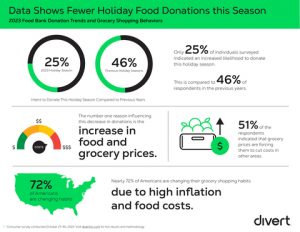Holiday Food Donations Expected to Decrease, Survey Says
 Divert, Inc. announced new data from a consumer survey and analysis on food bank donations, food insecurity and grocery shopping behaviors. The survey found that high inflation and grocery prices are having a significant impact on consumers’ food donations during the holiday season, as well as their grocery shopping habits and preferences.
Divert, Inc. announced new data from a consumer survey and analysis on food bank donations, food insecurity and grocery shopping behaviors. The survey found that high inflation and grocery prices are having a significant impact on consumers’ food donations during the holiday season, as well as their grocery shopping habits and preferences.
The United States throws away more than 63 million tons of wasted food each year. Couple this with recent research released by the U.S. Department of Agriculture on the state of household food security showing that the hunger problem is growing rapidly. In 2022, 17 million households reported being food insecure – significantly higher than both 2021 (13.5 million households) and 2020 (13.8 million households).
With this backdrop, Divert commissioned this survey to better understand how the current economic climate is affecting U.S. food banks and food security in the wake of the COVID-19 pandemic, especially as we enter the critical holiday season.
“Preventing waste through food donations to help feed people in need is central to our mission,” said Ryan Begin, CEO and co-founder, Divert. “Since 2018, we have worked with our customers to facilitate the donation of more than 12.5 million pounds of food, equivalent to nearly 10.5 million meals. With this survey and our analysis, we want to shed light on the state of food donations and consumer shopping habits so that we can help drive education, understanding, and real change.”
Grocery Prices Impacting Consumer Food Donations
Nearly half (46 percent) of respondents said they are more likely to donate to food banks during the holiday season than at other times of the year. Yet, with the 2023 holiday season approaching – in which demand for food banks is expected to surge – only 25 percent of respondents said they are more likely to donate during this year’s holiday season compared to years past. Those who are donating less to food banks this season cite increasing food and grocery costs as the number one reason driving their decision.
This behavior is emerging despite overwhelming knowledge among respondents that food insecurity is a growing concern – with 85% believing that food insecurity levels have increased since the COVID-19 pandemic and 63 percent believing that the United States is significantly more food insecure (16+ percent) than the latest USDA data shows (12+ percent). The majority of survey respondents (64 percent) have donated food or money to food banks in the last year, citing the increasing awareness of food insecurity as a key reason influencing their decision to donate more.
Other key findings:
- 24 percent of respondents typically donate to food banks once a quarter, 33 percent typically donate once a year, and 33 percent typically donate every couple of years
- Respondents donating more to food banks are doing so because of growing awareness of food insecurity (75 percent) followed by a passion for giving back (48 percent)
Changing Grocery Shopping Habits
The current economic climate is also having a significant impact on consumers’ behaviors, with nearly 72 percent of Americans changing their grocery shopping habits due to high inflation and food costs. More than half of respondents (51 percent) indicated that grocery prices are forcing them to cut costs in other areas.
The survey found that 25 percent of consumers are more anxious about their ability to afford food in the next three to six months and 30 percent are purchasing less fresh food like produce due to the skyrocketing price of groceries.
Other key findings on how consumers’ grocery shopping behaviors have changed in the past year:
- 76 percent of households are shopping for more discounted food
- 58 percent of households are shopping at less expensive food retailers
- 42 percent of respondents are shopping for less food at a time
- 17 percent of households are eating more food past its prime
- 63 percent of respondents said they are throwing away more food than they would like
For the full survey results and methodology, please click here.
Divert, Inc. is an impact technology company on a mission to Protect the Value of Food. Founded in 2007, the company creates advanced technologies and sustainable infrastructure to eliminate wasted food, driving social and environmental impact. Divert provides an end-to-end solution that prevents waste by maximizing the freshness of food, recovers edible food to serve communities in need, and converts wasted food into renewable energy. The company works with five Fortune 100 companies and nearly 5,400 retail stores across the U.S., helping food retailers to reach their sustainability goals.
For more news of interest to the food and beverage industry, subscribe to Gourmet News.






